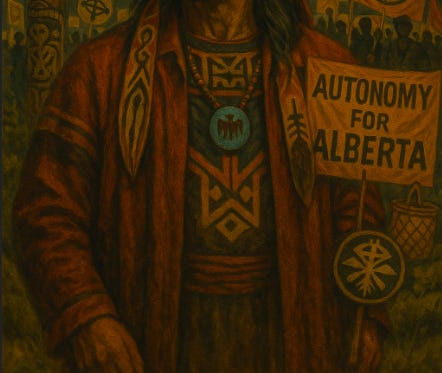Asserting Indigenous Sovereignty Amidst the Clash of East and West: A Turning Point for Canada
Canada is standing at a precipice, teetering between a future of fractured regional power and the possibility of a redefined national structure.
The clash of East and West is intensifying, and with the increasing sentiment for Alberta separatism, the timing has never been better for Indigenous communities to assert their own sovereignty. For far too long, we have been forced to accept a marginalized existence under the constraints of the Indian Act, and now, as we look towards the future, it’s time to ask: What would the end of the Indian Act look like, and how can we use this moment to negotiate a better deal for ourselves—one that allows for true self-determination?
The Indian Act has long been a tool of oppression, limiting our ability to govern our own lands, make decisions for our communities, and take control of our resources. Despite being the fastest-growing demographic in Canada, Indigenous peoples are still no closer to sovereignty than we were 157 years ago. In fact, we are arguably further away than we’ve ever been, still trapped in a colonial structure that has failed to deliver on the promises of self-governance and respect for Indigenous rights.
Our communities continue to suffer from the devastating effects of suicide, addiction, and poverty—issues that have been exacerbated by the federal government’s failure to deliver meaningful, long-term solutions. We are often told that we must “stay in our lane” to ensure we continue to receive government funding—but this is not sovereignty. This is dependency. We cannot continue to rely on the federal government to determine our futures, nor should we allow Ottawa to continue dictating the fate of our reserves.
Alberta separatism has emerged as a response to Ottawa’s control and the economic imbalances that have left the province feeling exploited and underserved. For over a century, Alberta has been subjected to a bad deal from Ottawa, one that has severely limited the province’s ability to control its resources, dictate its future, and shape its own destiny. It is no surprise that Alberta’s separatist sentiment is growing. But let’s be honest—Indigenous peoples have had a far worse deal from Ottawa since 1867. While Alberta has fought for its freedom and autonomy, we have been denied basic self-determination, control over our land, and the ability to make decisions that impact our own communities.
Instead of resisting Alberta’s calls for sovereignty, we should meet them at the table and demand the same for ourselves—not just in Alberta, but across Canada. Indigenous sovereignty is not just about decentralizing power from Ottawa; it’s about reclaiming control over our land, resources, and the future of our communities. Alberta’s fight for autonomy should be seen as an ally in our broader struggle for self-determination, and together we can create a new framework that allows both Alberta and Indigenous peoples to thrive outside the constraints of Ottawa’s control.
The Time for Negotiation is Now
As Alberta’s sovereignty movements gain momentum, it presents an opportunity for Indigenous peoples to push for a new deal—one that doesn’t just serve the interests of Alberta or the federal government, but instead, addresses the historical grievances and injustices faced by Indigenous peoples. The Indian Act cannot define us any longer. The Indian Act cannot be the standard by which we measure our success or determine our future.
The end of the Indian Act is not just a legal necessity; it’s a cultural imperative. We can no longer be expected to live under a law designed to control and assimilate us. The Indian Act has created a situation where we are told when we can govern, how we can govern, and what resources we can control. We must demand that Indigenous self-determination become a reality, not just an ideal.
The historical trauma we’ve experienced cannot be undone overnight, but we can take action now to ensure that our communities are empowered, self-sustaining, and resilient for generations to come. We must seize the moment when the door to sovereignty is being forced open, and ensure that we walk through it together, with a seat at the table where decisions about our future are made.
The time is now for Indigenous peoples to assert their sovereignty alongside Alberta's push for independence. Together, we can redefine the political landscape of Canada—one where Indigenous peoples are no longer subjects of the Indian Act, but fully empowered nations in their own right, with the ability to determine their own fate.
We cannot continue pretending that we are receiving a fair deal from Ottawa. Alberta’s call for freedom is not only about better deals for Alberta; it’s a reminder that we too deserve a better future—one where we control our land, resources, and destiny.
Darren Grimes






Beautifully put and very timely. I just came across the opposite sentiment and was wondering about dissenting views. Did you see the letter to Danielle Smith from the Sturgeon Lake and Mikisew Cree Nation Chiefs? What are your thoughts?
“Dear Premier Smith:
Re: Cease & Desist - Separatist Threats
You are attempting to manufacture a national unity crisis - by enabling a referendum on separatism and a fanatical cell of individuals - at the exact moment when Canadians need to unite against Donald Trump's America.
The province of Alberta is on Treaty lands.
Please be advised that your irresponsible statements and actions are in breach of Treaties No. 6, 7 and 8. We demand that you immediately stand down from this conduct.
Our Treaties are sacred covenants and are to last forever. Alberta did not exist when our ancestors agreed to share the land with the Crown. The province has no authority to supersede or interfere with our Treaties, even indirectly by passing the buck to a "citizen" referendum.
If you or any Canadians are not happy living on Treaty lands, they are free to apply for citizenship elsewhere.”